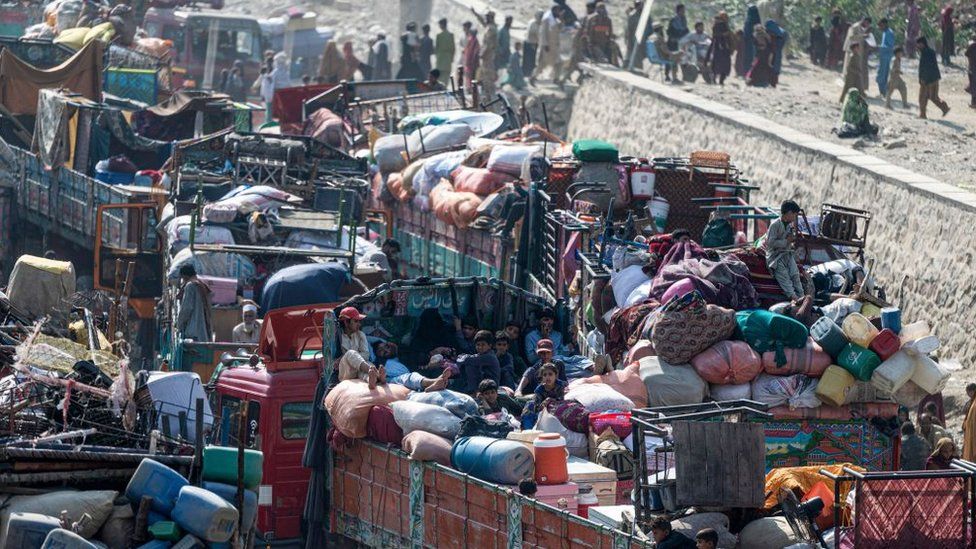-

-
-
Loading

Loading

Thousands of Afghan refugees living in Pakistan rushed to the border on Tuesday in order to meet the midnight deadline for undocumented foreigners to leave the country. Pakistan has issued an order stating that 1.7 million such individuals must leave by 1 November or face arrest and deportation, with the majority of them being Afghans. Many of these refugees are terrified, having fled Afghanistan after the Taliban regained control in 2021. Some have been in Pakistan for several decades. The sudden enforcement of this order has left many refugees uncertain about their future. Sadia, a young woman who has been studying in Peshawar, expressed her concern about being forced to leave Pakistan, as it would mean she would not be able to continue her education in Afghanistan. Tensions between Pakistan and Afghanistan have escalated due to an increase in cross-border attacks, which Pakistan blames on Afghanistan-based militants. The Afghan Taliban denies providing sanctuary to militants targeting Pakistan and considers the deportation of undocumented Afghans as unacceptable. Close to 200,000 Afghans have already returned home, and on Tuesday, approximately 20,000 more journeyed to the border as voluntary departure time ran out. According to a UN report, eight out of ten individuals who left expressed fear of being arrested if they stayed. These refugees, who fled Afghanistan when the Taliban took control of the government, are now anxious about their dreams and livelihoods being crushed once again. Pakistan, which has been grappling with an economic crisis, is running out of patience. In July, the Pakistani rupee experienced its sharpest drop against the dollar since October 1998. The UN's human rights office has urged Pakistani authorities to halt deportations to avoid a potential human rights catastrophe. The office expressed concerns that individuals facing deportation could be subjected to arbitrary arrest, detention, torture, and other inhumane treatment upon their return to Afghanistan. Under Taliban rule, women in Afghanistan have been denied the right to work and study, making their suppression of women's rights one of the harshest in the world. Girls are not permitted to attend school or participate in public spaces such as parks, gyms, and pools. Beauty salons have been shut down, and women are required to dress in full-body clothing. The Taliban also burned musical instruments earlier this year, citing moral corruption as the reason. Afghan singer Sohail, who fled Kabul the night the Taliban seized control, stated that he cannot continue his career as a musician in Afghanistan. Similarly, many Afghans are concerned about their limited options for livelihoods given the Taliban's rejection of music. The Taliban has claimed to establish a commission to provide basic services and temporary housing to returning Afghans. Pakistan has hosted hundreds of thousands of Afghan refugees over the years of conflict. According to the UN, around 1.3 million Afghans are registered as refugees, while another 880,000 have received legal status to remain in the country. However, Pakistan's Interior Minister Sarfraz Bugti asserts that 1.7 million individuals are living in Pakistan illegally. The UN estimates that there are more than two million undocumented Afghans in Pakistan, with at least 600,000 arriving after the Taliban regained power. Mr Bugti's expulsion order followed a surge in violence near the Pakistan-Afghanistan border involving armed fighters such as the Tehrik-e Taliban Pakistan (TTP) and the Islamic State militant group. The minister claimed that 14 out of 24 suicide bombings in Pakistan this year were carried out by Afghan nationals. Mr Bugti clarified that the crackdown aims to target unauthorized refugees in general and is not specific to Afghan nationals. In September, Pakistan experienced two suicide bombings that killed at least 57 people. The TTP denied involvement, but Mr Bugti stated that one of the suicide bombers was identified as an Afghan national.